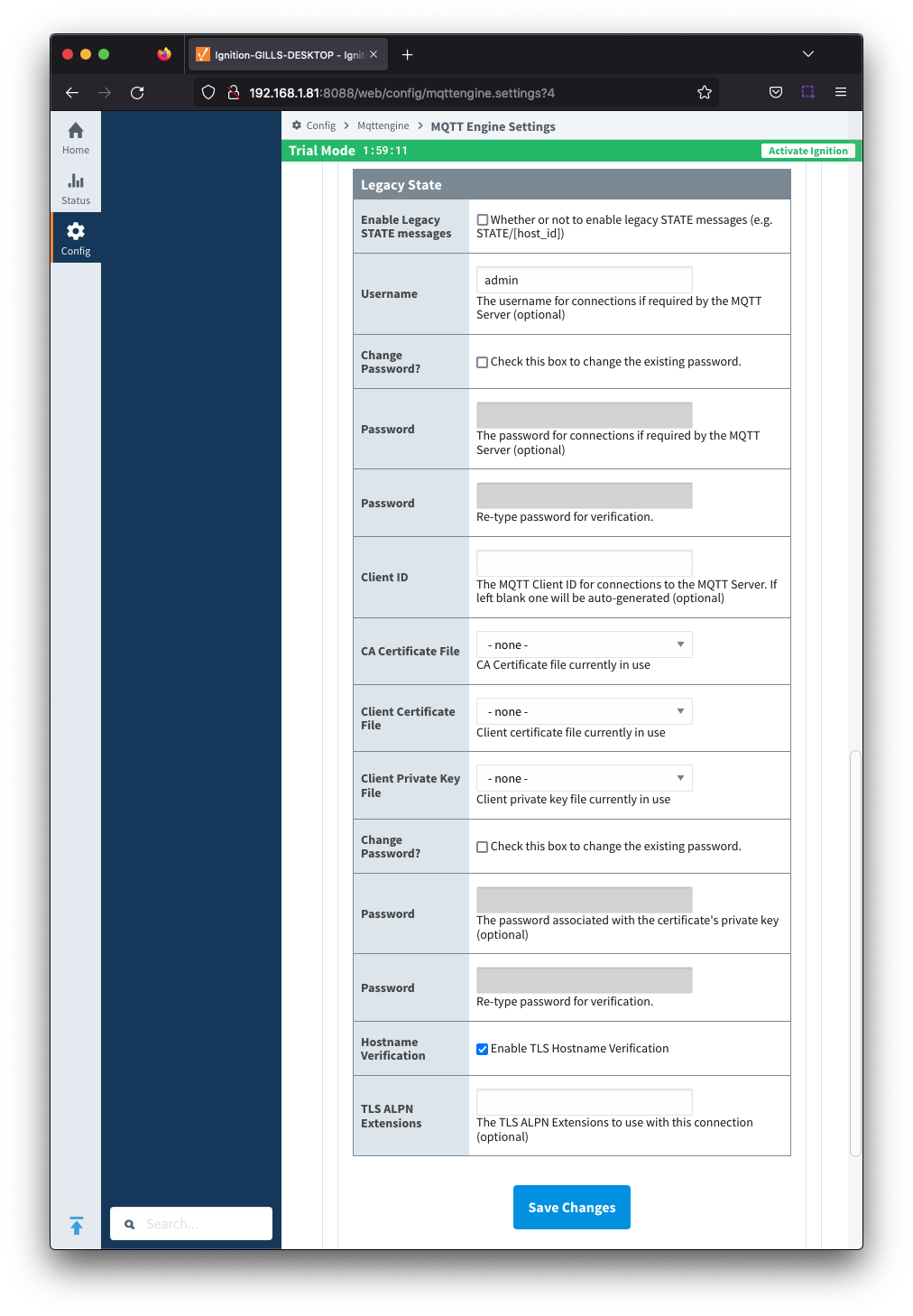...
The configuration sections available are Main, TLS, Advanced and Advanced .Legacy State
| Anchor |
|---|
| ServerSettingsMain |
|---|
| ServerSettingsMain |
|---|
|
Server Settings - Main
...
- Client ID
- Optional MQTT client ID to use. If specified this will be used in the MQTT Engine connect packet when connecting to the server. If left blank, a random client ID will be create of the form 'IgnitionTarget-xxxxxxxx-xxxx-xxxx'.
| Warning |
|---|
| Caution: MQTT Clients IDs must be unique and if two clients attempt to connect with the same client ID, one will be forcefully disconnected from the server to allow the other client to connect. |
- Keep Alive
- The maximum interval in seconds (0-65,535) between any two MQTT protocol control packets sent by the client to the server.
- Setting the Keep Alive to 0 will disable the Keep Alive functionality.
- If the client is idle and has no control packets to send, it will send PINGREQ protocol packet and the server is required to respond with a PINGRESP packet. If no response is received from the server within 1.5 times the Keep Alive, the client will close the connection.
If the server does not receive, at minimum, a PINGREQ message from a client within 1.5 times the Keep Alive, it will terminate the connection and send the client's LWT message if defined. For MQTT engine, with Primary Host enabled, this is a STATE message of OFFLINE.
- Filtered Namespaces
- A comma separated list of namespaces that will be filtered/disabled for connections to this MQTT Server.
| Anchor |
|---|
| ServerSettingsAdvancedLegacy |
|---|
| ServerSettingsAdvancedLegacy |
|---|
|
Server Settings - Advanced Legacy StateFrom release 4.0.14 MQTT Engine will support the new STATE message format and be in compliance with MQTT Sparkplug™ B specification v3.0.0.
However as there will still be many existing clients which are only compatible with the MQTT Sparkplug™ B specification v2.2, we have made changes to MQTT Engine to establish a MQTT client whose only function is to publish the STATE message in its legacy format.
If you are updating from a previous version of MQTT Engine to v4.0.14, the configuration of the Legacy State template will be completed as part of the upgrade process and the Legacy Client enabled.
| Note |
|---|
| Note: For some MQTT servers, the Username/Password for each client connection must be unique and so these parameters for the second legacy client will need to be edited |
 Image Added
Image Added
- Enable Legacy STATE messages
- Whether or not connections to enable legacy STATE messages (e.g. STATE/[host_id]). This is false by default.
- Username
- Optional MQTT username to use in the MQTT connect packet. This is required if the MQTT Server to connect to requires it.
- Password
- Optional MQTT password to use in the MQTT connect packet. This is required if the MQTT Server to connect to requires it.
- Client ID
- The MQTT Client ID for connections to the MQTT Server. If left blank one will be auto-generated.
- CA Certification File
- CA Certification file currently in use.
- Client Certification File
- Client Certification file currently in use.
- Client Private Key File
- Client Private Key file currently in use
- Password
- Optional password associated with the certificate's private key.
- Hostname Verification
- Enable TLS Hostname Verification. This is true by default.
- TLS ALPN Extensions
- Optional TLS ALPN Extensions to use with this connection
| Anchor |
|---|
| ServersCertificates |
|---|
| ServersCertificates |
|---|
|
Servers - Certificates
...
![]()
![]()
![]()
![]()
![]()
![]()
![]()
![]()
![]()